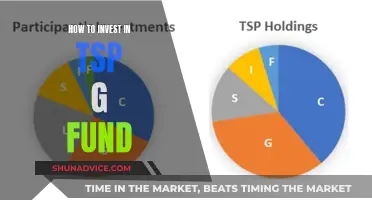
Mutual funds are a popular investment vehicle, particularly for retirement savings. They are a type of investment fund that pools money from many investors to purchase securities. The fund is then managed by professionals who invest in stocks, bonds, real estate, derivatives, and other securities. Mutual funds are often classified by their principal investments, such as money market funds, bond or fixed-income funds, stock or equity funds, or hybrid funds. The benefits of mutual funds include diversification, liquidity, and professional management. However, there are also drawbacks, such as high fees and a lack of control over the timing of recognition of gains.
| Characteristics | Values |
|---|---|
| Definition | A mutual fund is an investment fund that pools money from many investors to purchase securities. |
| Types | Money market funds, bond or fixed income funds, stock or equity funds, or hybrid funds. |
| Regulation | Regulated by governmental bodies. |
| Management | Professionally managed by fund managers. |
| Investment | Invested in stocks, bonds, money market instruments, gold, real estate and other similar assets. |
| Advantages | Economies of scale, diversification, liquidity, and professional management. |
| Disadvantages | Less control over the timing of recognition of gains, less predictable income, and no opportunity to customize. |
| Fees | Annual fees, expense ratios, or commissions. |
| Redemption | Mutual funds are highly liquid investments, allowing investors to redeem their shares on any business day. |
| Tax | Mutual funds are not taxed on their income and profits if they comply with certain requirements. |
What You'll Learn

Money market funds
There are several types of money market funds, including:
- Prime Money Funds: These funds invest in floating-rate debt and commercial paper of non-Treasury assets, such as those issued by corporations, government agencies, and government-sponsored enterprises.
- Government Money Funds: These funds invest primarily in cash and government securities, with at least 99.5% of their total assets in these instruments.
- Tax-Exempt Money Funds: Also known as municipal money market funds, these funds offer earnings that are exempt from federal income tax and, in some cases, state income taxes.
- Retail Money Funds: These funds are accessible to individual investors due to their small minimum investment requirements.
- Institutional Money Funds: These funds are designed for institutional investors but may also be available to retail investors.
While money market funds offer a stable and low-risk investment option, it is important to note that they are not insured by the Federal Deposit Insurance Corporation (FDIC) and are subject to market risks and fluctuations.
Retirement Planning: Beyond the 401(k) and Emergency Fund
You may want to see also

Bond or fixed-income funds
Benefits of Bond Funds
Bond funds offer higher income potential than money market funds, which focus on maintaining the value of your cash, and stock funds, which aim for long-term growth. They can also add stability to your portfolio by helping to balance the risks associated with stock funds. Inflation-protected bond funds, which invest in government bonds that are routinely adjusted for inflation, can help you keep pace with inflation.
Reducing Investment Risk
Fixed-income mutual funds can contain hundreds or even thousands of bonds in a single fund, providing more diversification than owning just a few individual bonds.
Choosing a Bond Fund
When considering bond funds for your portfolio, it's important to ask yourself a few questions. If you're in one of the highest tax brackets and investing outside of a retirement account, you may be able to reduce your tax exposure with a tax-exempt bond fund. You should also consider whether you want domestic or international bonds—investing in both can add another level of diversification to your portfolio. Finally, you should assess how much risk you are comfortable with.
Types of Bond Funds
Bond funds come with short-, intermediate-, or long-term maturities. The longer the maturity, the more sensitive the fund is to changes in interest rates. Bonds that are backed by the government or one of its agencies have the best "creditworthiness" and a lower chance of default than most corporate bonds. Corporate bonds with high credit quality are considered investment-grade, while those below investment grade are considered high-yield ("junk") bonds.
Risks of Bond Funds
Bond funds are subject to interest rate risk, which is the chance that bond prices will decline due to rising interest rates, and credit risk, which is the possibility that a bond issuer will fail to pay interest or principal in a timely manner, or that negative perceptions of the issuer's ability to make payments will cause the bond price to decline.
Vanguard's Anti-Gun Investment: Funds for a Safer Future
You may want to see also

Stock or equity funds
Equity funds can be categorised in several ways, including investment style, portfolio focus, and level of diversification. Actively managed funds and passive funds are the two primary categories. Actively managed funds have portfolio managers who actively research, analyse and select stocks with the goal of outperforming a benchmark index, such as the S&P 500. They use their expertise and various strategies to decide whether to buy, hold or sell stocks within the fund's portfolio. The success of an actively managed fund largely depends on the fund manager's skill and decision-making ability. Due to the more hands-on approach, these funds typically charge higher fees than passive funds.
Passive funds, on the other hand, include index funds, which aim to replicate the performance of a specific market index, such as the S&P 500. Passive fund managers do not attempt to outperform the market but instead track the index as closely as possible. Because passive funds require less active management, they generally have lower fees and taxes than actively managed funds.
Equity funds are also often categorised based on the size of the companies they invest in, with large-cap, mid-cap and small-cap funds focusing on large, medium and small companies, respectively. Additionally, equity funds can be classified as growth funds or value funds. Growth funds invest in companies with high earnings, sales and cash flow growth, typically characterised by high price-to-earnings (P/E) ratios and a lack of dividend payments. Value funds, on the other hand, invest in stocks that are considered undervalued, with lower P/E ratios, higher dividends and lower price-to-book ratios.
Sector and geographic specialisation is another way to categorise equity funds. Sector funds invest in stocks of companies operating within a particular industry or market sector, such as technology, healthcare or finance. Geographically focused funds, also known as regional funds, invest in stocks of companies based in certain areas of the world, with domestic, international and global funds differentiated by the location of the companies in which they invest.
Overall, stock or equity funds offer investors a way to gain exposure to a diversified portfolio of stocks, with the potential for higher returns than other asset classes. However, it is important to consider the risks associated with equity fund investing, such as market risk, credit risk, foreign currency risk and liquidity risk, among others.
Hedge Funds vs Investment Banks: Understanding the Key Differences
You may want to see also

Hybrid funds
There are several types of hybrid funds, including balanced funds and blended funds. Balanced funds typically hold a fixed proportion of stocks and bonds, such as 60% stocks and 40% bonds. On the other hand, blended funds mix growth and value stocks, offering investors diversification across different investment styles.
Another type of hybrid fund is the target date fund, or lifecycle fund. These funds also invest in multiple asset classes but differ from standard hybrid funds in their allocation strategy. Target date funds start with a more aggressive allocation and gradually rebalance towards a more conservative mix as a specified utilisation date approaches.
While hybrid funds offer the advantage of diversification and reduced volatility, they may also have some disadvantages. One of the main drawbacks is tax inefficiency, as they may produce more taxes than other types of funds. Additionally, the lower returns associated with hybrid funds' bond exposure compared to pure stock funds may be a consideration for some investors.
Fidelity Investments: Where Are Shareholder Funds Held?
You may want to see also

Index funds
- Broad market: These index funds include investments across companies of all sizes and industries, but they’re generally meant to represent the stock market as a whole.
- Sector: These index funds track the performance of a specific sector, such as health care, technology, or consumer goods.
- Domestic: These funds track the performance of groups of investments within the US.
- International: These funds track the performance of investments and markets outside the US.
- Bond: These funds invest in bonds that make up bond indexes.
- Dividend: These funds track companies that pay out higher dividends.
- Socially responsible: These funds track market indexes but can be exclusionary, removing companies from the index that don’t meet certain social or ethical standards.
Investing in index funds is straightforward. Here’s how to get started:
- Choose your investment platform: Select an online brokerage or investment platform that provides strong customer support, robust research, and analytical tools.
- Open and fund an account: Provide personal information, set up login credentials, and complete a questionnaire about investment goals and risk tolerance. Then, deposit funds through a bank transfer.
- Select an index fund: Research different funds to understand their performance history, management fees, and the indexes they track. Consider diversifying your portfolio by investing in several index funds.
- Buy shares: With your account funded, buy shares of your chosen fund through the website or app of your chosen platform.
- Monitor and adjust as needed: While index funds are typically long-term investments, it's wise to review your portfolio periodically to ensure it aligns with your financial goals.
Strategies for Picking a Hedge Fund to Invest In
You may want to see also







